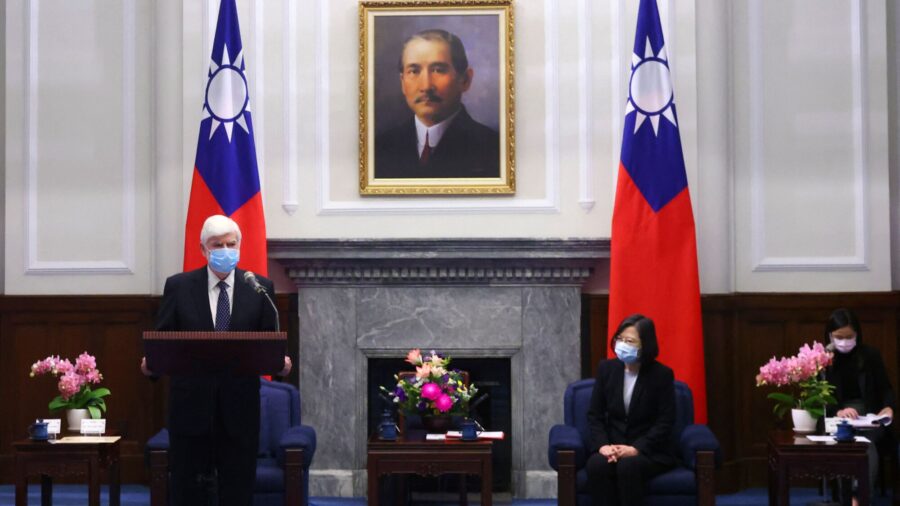TAIPEI, Taiwan—Taiwan President Tsai Ing-wen warned on April 15 that China’s military activities against the self-ruled island pose a threat to regional peace.
“Recently, China has frequently dispatched military vessels and aircraft to carry out maneuvers in waters and airspace surrounding Taiwan. These actions alter the status quo in the Indo-Pacific and threaten regional peace and stability,” Tsai said at the Presidential Office to welcome a visiting U.S. delegation, before the two sides held closed-door talks.
The delegation was headed by former U.S. Sen. Chris Dodd (D-Conn.) who arrived in Taiwan on April 14. The former senator was accompanied by former Deputy Secretaries of State Richard Armitage and James Steinberg, as well as Dan Biers, director of the Office of Taiwan Coordination at the State Department.
The visit marks the first U.S. delegation to visit Taiwan since President Joe Biden took office in January.
Tsai added: “We are very willing to work with like-minded countries, including the United States, to jointly safeguard the peace and stability of the Indo-Pacific region and deter aggression and provocation.”
The Chinese Communist Party (CCP) sees Taiwan as a part of its territory and has threatened war to bring the island into its fold. Since the start of this year, the Chinese military has been sending aircraft into Taiwan’s air defense identification zone (ADIZ) on a near-daily basis.
On April 12, 25 Chinese military aircraft, including 14 J-16 fighter jets, entered Taiwan’s ADIZ. It was the largest incursion ever reported by Taiwan’s Ministry of National Defense.
Two days later, on April 14, China’s Maritime Safety Administration announced that the Chinese military will hold live-fire drills at waters near the Nanpeng Islands in the South China Sea from April 15 to April 20.
Hours after Tsai’s remarks, China’s military aircraft entered the island’s ADIZ again, according to local outlet Liberty Times.
Bejing is angry at the U.S. visit. On Wednesday, at a daily briefing, China’s foreign ministry spokesperson Zhao Lijian said China has “lodged solemn representations with the U.S.” He also called on Washington to “prudently handle Taiwan-related issues” in order to “avoid further grave damage to China-U.S. relations.”

Also on Wednesday, China’s hawkish mouthpiece Global Times stated that the “unofficial” nature of the visit showed that the Biden administration “has no intention of crossing China’s red line on the Taiwan question and is still groping for its Taiwan policy.”
Washington currently has no formal diplomatic ties with Taipei but has maintained a robust relationship with the island based on the Taiwan Relations Act (TRA), which was signed into law by former President Jimmy Carter in April 1979. The United States is also Taiwan’s biggest arms supplier.
Speaking after Tsai at the Presidential Office, Dodd reaffirmed Washington’s relationship with Taipei.
“I can say with confidence that the United States’ partnership with Taiwan is stronger than ever,” Dodd said.
He added: “At the request of my long-standing friend, President Joe Biden, to reaffirm the U.S. commitment to this partnership and to deepening our cooperation on the multitude of interests that we share in common.”
Dodd said that the Biden administration will deepen its economic ties with Taiwan, in addition to helping the island to expand its “international space” and supporting Taipei’s “investments in self-defense.”
Beijing opposes Taiwan’s participation in international organizations and meetings, seeing any international presence that the island might enjoy as tantamount to suggesting that Taiwan is a de facto nation state. Currently, Taiwan is not a member of the World Health Organization because of objections by Beijing.
Steinberg applauded Taiwan’s success in containing the spread of the CCP virus, which causes the disease COVID-19. Taiwan has a total of 1,068 infection cases and 11 related deaths as of April 15.
“Taiwan’s magnificent efforts in responding to the COVID-19 outbreak are a testament to how a democracy can provide strong effective governance for the benefits not only for its own citizens, but for the globe,” Steinberg said at the Presidential Office.
On Thursday afternoon, Taiwan’s Ministry of Foreign Affairs took to Twitter to say that talks between the two sides were “warm, expansive, and highly productive” and Taiwan-U.S. relations “are rock solid and in great shape.”
In early March, U.S. Adm. Philip Davidson, head of U.S. Indo-Pacific Command, warned that China could invade Taiwan “in the next six years.” Other analysts believe the timeline could be much shorter.
From The Epoch Times


